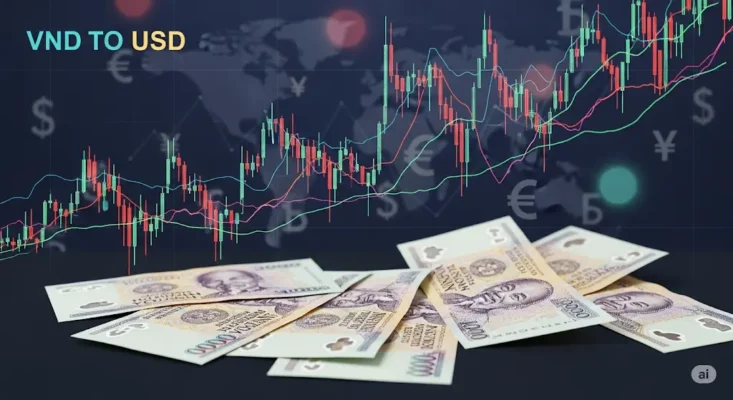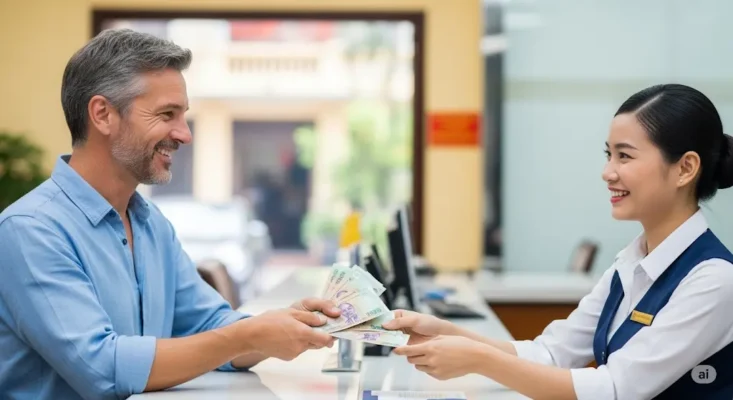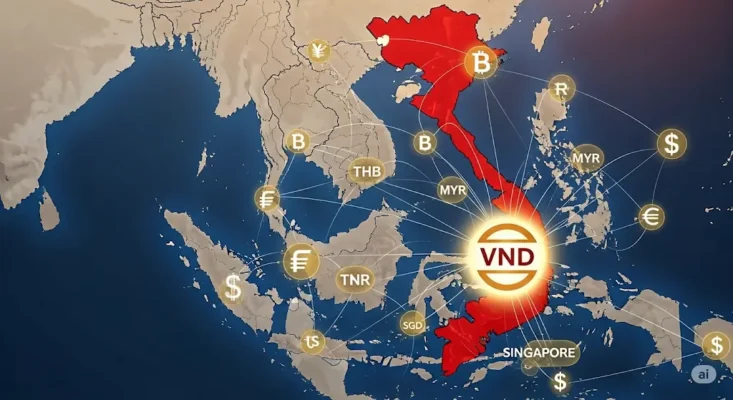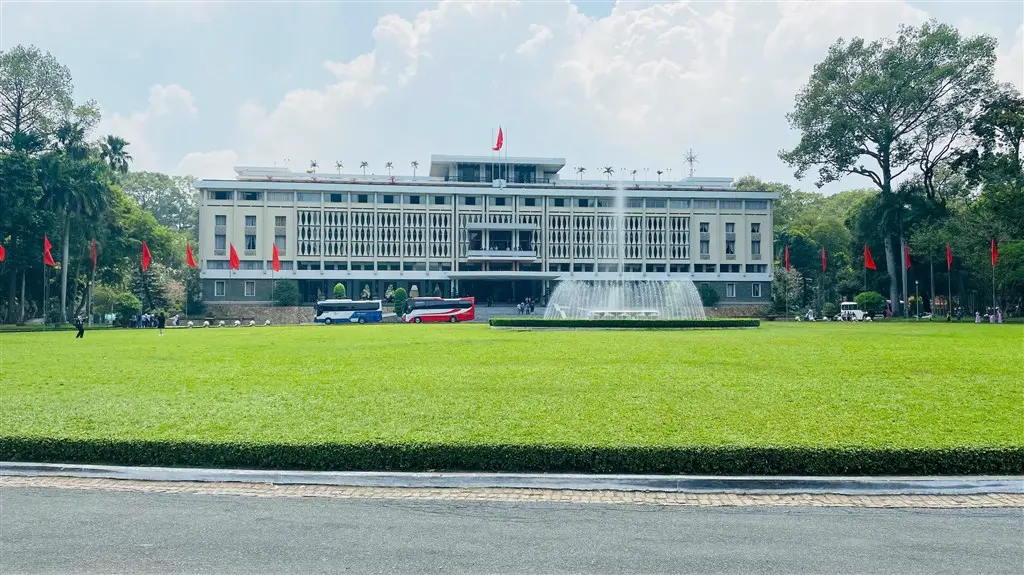Navigating a new country involves understanding its culture, its people, and importantly, its money. For visitors to Vietnam, or anyone interested in the Vietnamese economy, a clear understanding of the vietnam currency is essential. The official currency of vietnam is the Vietnamese Dong, usually denoted by the symbol ₫ or the ISO code VND. This guide, brought to you by EssentialVietNamtravel.com, aims to provide comprehensive information about vietnamese money, from exchange rates to everyday use.
Understanding the vietnam money currency will make your transactions smoother and your experience in this vibrant country more enjoyable. Many ask, “what is vietnamese money called?” or “what is vietnamese currency called?” – the answer is the Dong. We will explore everything you need to know about the vnd vietnamese dong.
Understanding Current Vietnam Currency (VND) Exchange Rates

The Vietnam exchange rate determines how much foreign currency you get for your Vietnamese Dong, or vice versa. This rate fluctuates. It changes based on various economic factors within the Vietnamese economy and the wider Global currency market. Knowing the current vietnam currency exchange rate today is vital before you exchange your money. The Vietnamese Dong (VND) is the vietnam financial unit you will use for nearly all transactions.
Planning Your Trip to Vietnam?
Understanding the currency is the first step. The next is finding the best flight deal. Use our favorite tool to compare prices and save big on your tickets!
While some tourist spots might list prices in US dollars, the currency in vietnam for daily life is the Dong. Understanding this rate helps you budget effectively for your trip and ensure you are getting fair value. You will often see the VND, Exchange Pair, USD/VND, as the US dollar is a common benchmark. The vietnamese monetary system is managed to maintain stability, but external factors always play a role. If you’re planning a trip, checking the vietnam currency exchange shortly before you travel is a wise step for managing your money for vietnam.
Factors Influencing the Vietnamese Dong (VND) Value
The value of vietnam currency, specifically the Vietnamese Dong (VND), is not static. Several key factors contribute to its fluctuations in the foreign exchange markets. The overall health of the Vietnamese economy plays a significant role; strong economic growth can bolster the Dong. Conversely, economic downturns can weaken it. Government policies, particularly those enacted by the State Bank of Vietnam, the country’s central bank and Issuing Authority, are crucial.
The State Bank manages Monetary policy, including interest rates and money supply, which directly impacts the Dong’s value and addresses Inflation. High inflation typically erodes currency value. Global economic trends and the strength of major currencies like the US dollar also influence the VND. Foreign direct investment and trade balances further affect the demand for and supply of the vietnam money, thereby influencing its exchange rate. The Dong is a Fiat Currency, meaning its value is backed by the government that issues it, the Government of Vietnam.
Where to Find Official Vietnam Exchange Rate Information (State Bank of Vietnam)
For the most reliable and official Vietnam exchange rate information, the primary source is the State Bank of Vietnam. This Central Bank publishes official exchange rates daily on its website. This is the benchmark rate used by commercial banks and financial institutions across Vietnam. While you might see slight variations at different exchange points, the State Bank of Vietnam emblem signifies authority. Many Vietnamese commercial bank websites also display current exchange rates for the Vietnamese Dong (VND) against various foreign currencies.
Reputable international financial news websites can also provide up-to-date information on the vietnam currency exchange rate today. Be cautious of unofficial sources or apps that may not reflect real-time, accurate data for the official currency of Vietnam. Always cross-reference if you are unsure, especially when dealing with the currency unit of vietnam for significant transactions.
Tips for Getting the Best Exchange Rate for Your Vietnam Money
Securing the best possible Vietnam exchange rate for your vietnamese money requires a bit of planning. Firstly, avoid exchanging large amounts of vietnam currency at airports. While convenient, airport exchange counters often offer less favorable rates and may have higher fees for vietnam money exchange. Banks within cities in Vietnam, such as in Hanoi or Ho Chi Minh City, generally provide better rates for the Vietnamese Dong (VND). Licensed gold shops are also a popular option among locals and tourists for exchanging currency to vietnam, often offering competitive rates for the Dong.
Before exchanging, always ask about any commission fees or service charges, as these can impact the net amount you receive. Comparing rates between a few reputable places can save you money. Some of the Best Vietnamese Dong exchange services are transparent about their fees. Also, consider the amount you need; exchanging larger sums at once might sometimes secure a slightly better rate than multiple small transactions for your vietnam dollars.
A Visual Guide to Vietnamese Dong (VND) Banknotes and Coins

The vietnamese currency system primarily uses banknotes, with coins being less common in daily transactions. The current series of Vietnamese Dong banknotes are notable for their Polymer substrate, which makes them more durable and incorporates advanced Security features compared to paper money. This helps in preventing Counterfeit money.
A prominent and consistent feature on most vietnam banknotes is the Ho Chi Minh portrait, honoring the nation’s revolutionary leader. The designs also often feature national symbols, cultural motifs like the Lotus flower motif, and significant Vietnamese landmarks. Understanding what does vietnamese money look like will help you quickly familiarize yourself with the vietnam money notes and vietnamese dong bills.
While vietnamese dong coins (and coins in vietnam generally) exist, particularly in smaller denominations of the Dong, they are not widely circulated for everyday purchases. The vietnam bills are the primary Medium of exchange. Learning the vietnamese money denominations is key to smooth transactions.
Identifying Common Vietnamese Dong Denominations: From 1,000 to 500,000 VND
The Vietnamese Dong (VND) features a range of denominations to facilitate various transaction sizes. Common vietnamese currency denominations you will frequently encounter include: 1,000 VND, 2,000 VND, 5,000 VND (these three are often older paper notes or less common polymer), 10,000 VND, 20,000 VND, 50,000 VND, 100,000 VND, 200,000 VND, and the 500000 Dong Note.
Each denomination of these vietnamese dong bills has a distinct color and size, aiding in quick identification. For example, the 100,000 VND note is typically yellowish-green, while the 500000 Dong Note has a Dominant Color of blue. Familiarizing yourself with these vietnam money notes will make payment vietnam much easier. The High nominal value denominations mean you might carry notes with many zeros. The Vietnamese Currency, Common Denomination, 100000 Dong is widely used.
Key Features of Vietnam Currency: Ho Chi Minh Portrait and Polymer Notes
Two of the most distinctive features of modern vietnam currency are the recurring Ho Chi Minh portrait and the use of Polymer substrate for most vietnamese dong banknotes. The image of Ho Chi Minh, a pivotal figure in Vietnamese history, is a consistent Ho Chi Minh, Depiction, Banknote Portrait on the obverse of nearly all circulating vietnam currency notes. This serves as a symbol of national identity and respect.
The shift to polymer for vietnamese dong notes has several advantages. Polymer notes are more durable than paper, lasting longer in circulation and resisting tearing and moisture. They also allow for more sophisticated Security features, making the vietnam money harder to counterfeit. These Historical designs combined with modern materials define the current vietnamese money. The State Bank of Vietnam began introducing these polymer notes in the early 2000s.
Recognizing the VND Symbol (₫) and Other Security Elements on Vietnam Money
The official symbol for the Vietnamese Dong is ₫, often seen after the numerical amount (e.g., 50,000₫). The ISO code VND is also widely used, especially in financial contexts and for vietnam currency exchange. Beyond the symbol, current vietnamese dong money incorporates several Security features to deter counterfeiting and ensure the integrity of the vietnam money currency.
These include a Vietnamese Currency, Security Element, Transparent Window with an embossed image, micro-text (Microprinting security) that is difficult to replicate, latent images visible only at certain angles, and often a Unique serial numbering system. The Vietnamese Banknote, Common Motif, National Emblem is also present. When receiving vietnam currency money, especially larger denominations, it’s wise to be aware of these features. Taking a moment to check these elements can help you avoid accidentally accepting Counterfeit money.
Safely Exchanging and Obtaining Vietnamese Dong (VND) for Your Trip to Vietnam

When you travel to Vietnam, you will need Vietnamese Dong (VND) for most of your purchases. While some tourist-oriented businesses might accept us currency in vietnam, the official currency of Vietnam is the Dong, and it is the required Medium of exchange for the vast majority of transactions. Therefore, knowing where to buy Vietnamese Dong and how to do it safely is crucial for a hassle-free trip.
You have several options for vietnam money exchange, both before you depart and upon arrival in Vietnam. Planning how to purchase vietnamese dong in advance can save you time and potentially money. Remember, for everyday items, local markets, and transportation, payment vietnam will almost certainly be in VND. Understanding the process to exchange your home currency for vietnam country currency is a fundamental part of travel preparation.
Best Places to Exchange Currency in Vietnam: Banks, Gold Shops, and ATMs
There are several reliable options for exchanging your money into Vietnamese Dong (VND) once you are in Vietnam. Banks are a secure choice; they are official, regulated institutions and you can find branches in most cities and towns. They offer fair rates for the vietnam currency exchange, though they may have specific operating hours. Gold shops, often found in marketplaces, are another popular option and sometimes offer slightly better rates than banks for the currency of vietnam. Look for licensed shops.
ATM Vietnam access is widespread, especially in urban areas and tourist destinations. Using atm machines in vietnam is convenient for withdrawing VND directly from your bank account, but be aware of potential withdrawal fees from your home bank and the local ATM provider. Some travelers find ATMs the Best Vietnamese Dong exchange services for convenience. Always inform your bank of your travel plans to ensure your cards work smoothly. Consider these options when deciding where to exchange vietnamese dong.
Avoiding Scams and Counterfeit Vietnam Money When Exchanging
While Vietnam is generally a safe country for travelers, it’s wise to be cautious when dealing with vietnam currency money to avoid scams or receiving Counterfeit money. Always count your vietnamese dong money carefully before leaving the exchange counter. Familiarize yourself with the look and feel of genuine vietnamese dong banknotes, including their Security features like the clear polymer window and raised print.
Stick to reputable exchange points: official banks, licensed money changers (like some gold shops), and hotel exchange desks (though hotel rates might be less favorable). Be wary of individuals approaching you on the street offering to exchange money from vietnam; these are often scams. If a rate seems too good to be true, it probably is. Using an official vietnam money changer reduces risk. Important Warning: Always double-check the denominations you are given, as the high numbers and many zeros on VND notes can be confusing initially.
Understanding Fees and Commissions for Vietnam Currency Exchange
When you undertake a vietnam currency exchange, it’s important to understand that the rate you see advertised might not be the exact amount of Vietnamese Dong (VND) you receive. Many exchange services charge commission fees or have a “spread” (the difference between their buying and selling rates) built into their vietnam exchange rate. Before committing to an exchange, always ask explicitly about all applicable fees and commissions.
Some places might advertise “no commission” but offer a less favorable exchange rate for the vietnam money currency exchange. Calculate the final amount you will receive for your currency to vietnam and compare it with other options if possible. ATMs will also have fees – usually one from your home bank and one from the local Vietnamese bank operating the ATM. Transparency regarding fees is a hallmark of Best Vietnamese Dong exchange services.
Practical Tips for Using Vietnamese Dong (VND) Currency During Your Stay in Vietnam
Once you have your Vietnamese Dong (VND), using it effectively will make your daily experiences in Vietnam much smoother. The vietnam money system, with its High nominal value denominations, can seem unusual at first, especially if you are used to currencies with fewer zeros. For instance, a common meal might cost tens of thousands or even hundreds of thousands of Dong.
Getting comfortable with handling vietnamese dong money and making cash in vietnam payments quickly is key. You will be using vietnamese bills for almost everything, from street food to souvenirs. Knowing what money to use in vietnam (which is primarily VND) and how to manage it will prevent confusion and help you feel more confident as you explore. The vietnamese monetary unit is central to all local commerce.
Managing Large Denominations of the Vietnamese Dong
The Vietnamese Dong (VND) includes several High nominal value denominations, such as the 100,000, 200,000, and 500,000 Dong notes. While these vietnamese bills are useful for larger purchases, they can sometimes be inconvenient for smaller transactions. Street vendors or small shop owners might struggle to provide change for a 500,000 VND note if you are only buying a small item.
It’s a good practice to try and break larger vietnam money bills at convenience stores, supermarkets, or restaurants where they are more likely to have sufficient change. Carrying a mix of denominations, including smaller vietnam money notes like 10,000, 20,000, and 50,000 VND, is advisable for everyday purchases. This will make your transactions quicker and easier for both you and the vendor.
Cash vs. Card: Payment Norms in Vietnam
In Vietnam, cash in vietnam is king. While larger establishments like hotels, upscale restaurants, and major tourist attractions increasingly accept vietnam credit card payments, the vast majority of daily transactions, especially at local markets, street food stalls, smaller shops, and for local transportation, are conducted in cash in vietnam – specifically, Vietnamese Dong (VND).
It’s essential to carry enough vietnam cash for your daily needs. Relying solely on cards is not advisable, particularly if you plan to explore outside major tourist hubs. Even where cards are accepted, there might occasionally be a surcharge, or the connection might be unreliable. For payment vietnam generally, and for interacting with the local Vietnamese economy, having VND on hand is crucial. Always check if card payment is an option before ordering or committing to a purchase if you prefer not to use cash.
What to Do with Leftover Vietnamese Dong (VND) Currency
At the end of your trip to Vietnam, you might find yourself with some leftover Vietnamese Dong (VND). You have a few options for this money for vietnam. You can exchange it back to your home currency at the airport or at banks before you depart. However, be aware that the exchange rate for selling VND back might not be as favorable as when you bought it, and there might be restrictions on exchanging vietnamese dong coins.
Another option is to spend your remaining Dong on last-minute souvenirs, snacks, or other items at the airport. Some travelers choose to keep a few smaller denomination vietnam currency notes or coins in vietnam (if they have any) as mementos of their trip. If you plan to return to Vietnam or know someone who is, you could also hold onto it. Check where to exchange vietnamese dong to usd or other currencies at airport counters.
The Story of the Vietnamese Dong (VND): A Brief History of Vietnam’s National Currency
The vietnamese dong (VND), the official currency of Vietnam, has a fascinating past that mirrors the nation’s own complex Vietnamese history. Understanding the History of Vietnam currency notes provides insight into the economic and political transformations the country has undergone. The Dong vietnam as a vietnam’s currency has seen various iterations and revaluations, particularly during the tumultuous 20th century.
It reflects periods of division, reunification, and economic reform. The State Bank of Vietnam plays the central role in issuing and managing the VND, ensuring it serves as a stable Unit of account and Store of value for the National assets of the Socialist Republic of Vietnam. The journey of the vietnam currency name, Dong, is tied to the country’s identity.
Introduction of the Dong as Vietnam’s Official Currency
The term “đồng” originally referred to bronze coins used during feudal times in Vietnam. The modern Vietnamese Dong (VND) was introduced as the official currency of Vietnam at different times in North and South Vietnam before the country’s reunification. North Vietnam introduced its Dong in 1946, replacing the French Indochinese piastre. South Vietnam introduced its own Dong in 1953, also replacing the piastre.
After the reunification of Vietnam in 1978, a unified Dong was established. This marked a significant step in creating a unified Vietnamese monetary system. The name of vietnam currency, Dong, has thus been associated with Vietnamese money for a long time, becoming the vietnam country currency name recognized today. This vietnam currency unit is backed by the Vietnamese government.
Evolution of Banknote Designs and Denominations of the Vietnamese Dong
The design and denominations of vietnamese dong banknotes have evolved considerably over the decades, reflecting changes in the Vietnamese economy and security needs. Early vietnam banknotes were often simpler in design and printed on paper. Over time, particularly due to Inflation, higher denominations were introduced. A significant development was the transition to Polymer substrate for new vietnam currency notes starting in the early 2000s.
These polymer notes, like the current series featuring the Ho Chi Minh portrait, incorporate more advanced Security features and offer greater durability. Historical designs on older notes often depicted scenes of agriculture, industry, and national unity, while modern notes consistently feature Ho Chi Minh. The State Bank of Vietnam manages these Commemorative issues and design changes. The vietnamese dong notes have thus transformed significantly.
The Role of the State Bank of Vietnam in Managing the VND
The State Bank of Vietnam (SBV) is the central bank of the Socialist Republic of Vietnam and plays the pivotal role in managing the Vietnamese Dong (VND). Its responsibilities are extensive and crucial for the stability of the Vietnamese monetary system and the broader Vietnamese economy. The State Bank of Vietnam, Type, Central Bank, is responsible for issuing vietnam currency, implementing Monetary policy, managing foreign exchange reserves, supervising financial institutions within the Vietnamese banking system, and working to control Inflation.
It ensures the Dong functions effectively as the nation’s Legal tender and Medium of exchange. The SBV’s actions directly influence the value of vietnam currency and its stability in both domestic and Foreign exchange markets. It is the ultimate Regulated by a central monetary authority for the VND.
Key Information About the Vietnamese Dong (VND) and the Vietnamese Financial Market
The Vietnamese Dong (VND) is more than just vietnam money for daily transactions; it is a cornerstone of the Vietnamese financial market and reflects the economic trajectory of Vietnam. Understanding the VND in this broader context helps appreciate its significance as the vietnam country currency. The Dong is the monetary unit of vietnam, and its stability and convertibility are key concerns for the State Bank of Vietnam.
While primarily used within Vietnamese borders, its exchange rate against major global currencies like the US dollar is closely watched by businesses and investors. “What is vietnamese currency?” is a common question, and the answer, the Vietnamese Dong, represents the nation’s economic sovereignty. The currency unit of vietnam is integral to the Vietnamese economy.
The Vietnamese Dong’s Place in the Southeast Asian Financial System

The Vietnamese Dong (VND) plays an important role within the Southeast Asian financial system. As Vietnam’s economy has grown and integrated more with regional and global markets, the significance of its currency in vietnam has also increased. Compared to some other Southeast Asian currencies, the VND has historically had a higher number of nominal units to major currencies, often a subject of discussion regarding the value of vietnam currency.
The Vietnamese economy is one of the fastest-growing in the region, and this dynamism influences the perception and stability of the Dong. Cross-border trade and investment flows between Vietnam and its neighbors in Southeast Asia mean that the VND’s performance is relevant to regional financial stability. The State Bank of Vietnam often coordinates with other central banks in the region.
Understanding the Stability and Outlook for the Vietnam Currency
The stability of the Vietnamese Dong (VND) is a key objective for the State Bank of Vietnam. Historically, Vietnam has experienced periods of high Inflation, which can impact the value of vietnam currency. However, in recent years, the government has made significant efforts to maintain macroeconomic stability, control inflation, and manage the Dong’s exchange rate within a reasonable band.
The outlook for the vietnam currency is generally tied to the performance of the Vietnamese economy, levels of foreign direct investment, trade balances, and global economic conditions. While predicting currency movements is complex, ongoing economic reforms and growth in Vietnam are positive indicators. Travelers should be aware that the Dong is Subject to inflation, and its value Fluctuates against other currencies. The Vietnamese Dong, Monetary Class, Fiat Currency, is managed to foster this stability.
The Official Status of the VND: Is Other Currency Accepted in Vietnam?
The Vietnamese Dong (VND) is the official currency of Vietnam and the sole Legal tender for all transactions within the country. This means that by law, all goods and services should be paid for using VND. While in some major tourist areas, hotels, or high-end shops, prices might be quoted in US dollars (you might hear questions like “does vietnam take usd” or “does vietnam accept us dollars”), and they might accept Foreign currency as a convenience, this is not the norm across the country. It is always advisable and often legally required to use VND for your purchases.
Relying on us currency in vietnam can lead to unfavorable exchange rates set by individual vendors. To ensure smooth transactions and respect local regulations, always plan to use the vietnam dong currency. So, “what currency does vietnam use?” – overwhelmingly, it’s the VND. “Is $100 a lot of money in vietnam?” It depends on the exchange rate, but it can cover significant expenses.
We at EssentialVietNamtravel.com hope this comprehensive guide to vietnam currency has been helpful. Understanding the Vietnamese Dong (VND), from its Economic value and Design and aesthetics to its Practical usability and Historical significance, will undoubtedly enhance your experience in Vietnam. Remember to check current exchange rates, be mindful of security features, and embrace using the local vietnam money for an authentic journey. The Vietnamese Dong, Symbol, ₫, and Vietnamese Dong, ISO Code, VND, will become familiar companions during your travels. Enjoy exploring the wonders of Vietnam!


